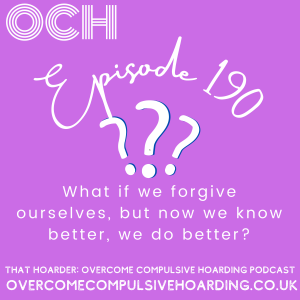
Friday Jun 13, 2025
#190 What if we forgive ourselves, but now we know better, we do better? Choosing compassion over shame in hoarding disorder
- Come to a Dehoarding Accountability Zoom Session: http://www.overcomecompulsivehoarding.co.uk/ticket
- Subscribe to the podcast: https://www.overcomecompulsivehoarding.co.uk/subscribe
- Podcast show notes, links and transcript: http://www.overcomecompulsivehoarding.co.uk/
Today I’m looking at what happens if we forgive ourselves for past hoarding behaviours, why we maybe should, and how we can actually use that insight to make better choices and move forward. I talk honestly about the shame and guilt that keeps so many of us stuck. There’s some reflection on the roots of hoarding, the importance of self-compassion, and why hating ourselves into action just doesn’t work - plus a few practical suggestions for anyone trying to make a change, no matter where you’re starting from.
Buy your copy of Everything You Need to Know About Hoarding by Dr Lynne Drummond at cambridge.org/EverythingHoarding, and get 20% off with the discount code HOARDING20. #ad
- Forgiving Ourselves but Doing Better
- Exploration of guilt and shame related to hoarding and feeling overwhelmed.
- Reflection on self-blame, regret, and paralysis it can cause.
- Catholic upbringing: Confession, forgiveness, and the importance of genuine intent to change.
- Recognition that hoarding often stems from trauma, loss, fear, anxiety, or neurodivergence.
- Discussion of cause and effect - influences behind hoarding behavior.
- Emphasis that hoarders are not lazy or bad people, but in a complex situation.
- The cycle of self-judgement and the importance of self-compassion as an antidote to shame.
- Practical advice: Treat oneself with the compassion you’d offer others, challenging negative self-talk.
- How self-criticism can demotivate and hinder progress.
- Comparison: Encouraging someone else is more effective than berating oneself.
- Understanding mistakes, taking responsibility, and making amends when possible.
- The importance of learning from past experiences and committing to doing better.
- Practical Strategies for Moving Forward
- Suggestions for emotional and action-oriented progress:
- Journalling or talking to someone about feelings.
- Looking back with compassion to identify patterns and triggers.
- Start dehoarding by breaking tasks into small steps.
- Avoiding perfectionism; celebrating any progress.
- Reference to "towards and away moves" from episode 182 with Dr. Jan Eppingstall.
- Identifying values and making choices that align with them.
- Finding support from therapists, friends, family, support groups, or accountability sessions.
- Acknowledgement that forgiving oneself is challenging but necessary for progress.
- Emphasising persistence, compassion, and learning from mistakes.
- Encouragement and Validation
- Recognition of listeners at various stages of their journey - starting, struggling, making progress, or just listening for now.
- Assurance that small steps count and everyone is doing their best.
- Emphasis that listeners are not alone.
Links
- Podcast ep 181: Past influences and future possibilities: cause and effect and hoarding disorder (plus Podcasthon)
- Podcast ep 95: Shame and hoarding with Professor Luna Dolezal
- Podcast ep 182: What are “towards and away moves” and what on earth do they have to do with hoarding recovery? With Dr Jan Eppingstall
- The Gray Area podcast
- Come to a Dehoarding Accountability Zoom session: Accountability Booking Form
- Website: Overcome Compulsive Hoarding
- Become a Dehoarding Darling
- Submit a topic for the podcast to cover
- Questions to ask when dehoarding: https://www.overcomecompulsivehoarding.co.uk/podquestions
- Instagram: @thathoarderpodcast
- Twitter: @ThatHoarder
- Mastodon: @ThatHoarder@mastodon.online
- TikTok: @thathoarderpodcast
- Facebook: Overcome Compulsive Hoarding with That Hoarder
- Pinterest: That Hoarder
- YouTube: Overcome Compulsive Hoarding with That Hoarder
- Reddit: Overcome Compulsive Hoarding with That Hoarder subreddit
- Help out: Support this project
- Sponsor the podcast
Subscribe to the podcast
No comments yet. Be the first to say something!